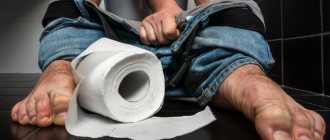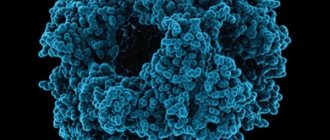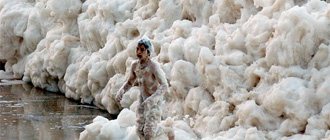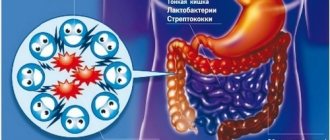In almost every case, the poisoning process is always accompanied by diarrhea. It can last for several days, and sometimes is longer.
If its causes lie in poisoning of the body, then it lasts 2-3 days and practically does not require any treatment. At this time, the body cleanses itself of toxins and poisonous substances.
But if diarrhea does not stop for 4 days or does not go away for more than a week, you should immediately seek help from a doctor.
Often, such diarrhea is accompanied by additional symptoms - the presence of fever, pain in the gastrointestinal tract and severe weakness.
Such dangerous signs cannot be ignored, since loose stools can be the result of a serious disorder in the body of an adult, and in the absence of proper treatment, this can lead to serious illnesses that are difficult to treat.
Chronic form
Diarrhea (diarrhea) is called acute when bowel movements occur more than twice a day, the stool is liquid and it lasts no more than 2-3 weeks. At the same time, there is no recurrence of such phenomena in the medical history.
Infectious diarrhea
Acute infectious diarrhea is characterized by the following symptoms:
- general malaise
- fever
- lack of appetite
- vomit.
Among the intestinal diseases in which the dominant symptom is acute diarrhea are dysentery, cholera, salmonellosis, and yersiniosis.
Vomiting mainly occurs with foodborne infections caused by staphylococci. For patients with salmonellosis and dysentery, its appearance is not typical.
The most common causes of acute diarrhea are norovirus and rotavirus. They are contagious and are transmitted both from person to person and through household items and dirty products.
Single-celled and multicellular intestinal parasites can also cause diarrhea. Single-celled living creatures are called protozoa in zoology. These include, for example, amoebas or lamblia. Other intestinal parasites that cause diarrhea are worms.
If blood appears in loose stools, this may indicate damage to the intestinal mucosa by pathogenic microbes such as Shigella, Campylobacter jejuni, and Escherichia coli with enteropathogenic properties. The possibility of venereal disease of the rectum should be kept in mind.
Acute bloody diarrhea may be the first manifestation of ulcerative colitis and Crohn's disease. In this case, severe abdominal pain and a serious clinical condition occur.
Diarrhea when taking antibiotics is caused by a disturbance in the bacterial flora of the intestines. As a rule, it does not worsen a person’s general condition and stops after stopping the medication. However, sometimes during antibiotic therapy pseudomembranous colitis can develop, which is characterized by sudden severe watery diarrhea with high fever, and possibly blood in the stool.
Most often, travelers' diarrhea is detected in people visiting countries with unfavorable epidemiological conditions.
The disease is caused by consuming food and water contaminated with feces. The causative agents are most often Escherichia coli, enteroviruses, and less often - Shigella, amoeba and Giardia.
The disease is not transmitted directly from one person to another. Sources of infection are meat, eggs, milk, culinary products, and water.
Traveler's diarrhea begins acutely. Symptoms such as:
- nausea
- vomit
- rumbling
- transfusion
- stomach ache
- diarrhea.
In the case of a viral infection, the disease is accompanied by headache and muscle pain.
Treatment requires a gentle diet with the exception, first of all, of raw vegetables and fruits. Intestinal antiseptics should be taken. It is important to skillfully determine the dose of drugs so as not to cause irritable bowel syndrome.
As a preventive measure, it is necessary to strictly observe the rules of personal hygiene, wash food thoroughly, do not buy food from hand, and do not drink raw water.
If diarrhea is not accompanied by fever and a noticeable deterioration in condition, then it is often enough to change your diet, drink herbal astringent decoctions or take an antidiarrheal drug. Nutrition and home remedies for diarrhea will be discussed later in the article.
But it is important not to miss the onset of a serious illness, therefore, in case of diarrhea with high fever or the presence of blood in the stool, bacteriological examinations of the stool and sigmoidoscopy are necessary. This will determine whether the cause of diarrhea is dysentery, ulcerative colitis, or pseudomembranous colitis, which is a complication when taking antibacterial drugs.
Diarrhea is chronic if it lasts more than 3 weeks. They talk about the chronic form and in the case of too much stool, more than 300 g per day. Although if a person consumes a lot of plant fiber, then this weight may be normal.
With chronic diarrhea, the body constantly loses fluids, electrolytes and other nutrients. Therefore, at the same time, many people suffer from insufficient weight, deficiency of vitamins and microelements and related complications. It is very important to quickly find the cause of diarrhea and begin treatment. It is especially important to make a quick diagnosis in children, since chronic diarrhea in children can cause developmental delays.
Causes
The main causes of chronic diarrhea are not only diseases of the gastrointestinal tract, but also a number of other factors.
Main reasons:
- laxative abuse
- systemic diseases
- surgical interventions
- chronic alcoholism
- worms and parasites
- gastrointestinal diseases
- tumors.
Diarrhea accompanies diseases such as diabetes, endocrine disorders, and scleroderma. This is due to impaired motor function of the small intestine. Sometimes diarrhea is the first clearly visible sign of these diseases. Therefore, it is important to make an accurate diagnosis. For example, with hyperthyroidism, the main manifestation of the disease in the first stages can also be prolonged diarrhea, while the main signs of the disease (a constant feeling of heat, irritability or weight loss with a good appetite) may recede into the background and not be taken into account by the patient.
The cause of chronic diarrhea in patients who have undergone gastric or intestinal resection may be bacterial contamination of the small intestine and disruption of its motor function.
After removal of the pancreas, diarrhea occurs, as with chronic alcoholism and frequent exacerbations of chronic pancreatitis. This is due to a deficiency of all pancreatic enzymes.
Diarrhea accompanies Crohn's disease and ulcerative colitis. Loose stools in such patients are usually profuse, foul-smelling, with floating fat. If there was previously a fissure of the rectum or paraproctitis, then it is possible to assume Crohn's disease. These diseases may have extraintestinal manifestations such as arthritis or skin lesions.
Diarrhea can also be accompanied by diseases such as chronic gastritis of the stomach, diseases of the pancreas, hepatobiliary system, endocrine glands, as well as allergic reactions and hypo- and avitaminosis. Inflammation of diverticula during diverticulosis can also be the cause.
Tumors and diarrhea
Tumors of the rectum and colon may also present with diarrhea. The absence of other causes of this disorder in older patients and the presence of blood in the stool support this assumption.
In patients with carcinoid syndrome, the disease may be accompanied by episodes of profuse watery diarrhea. If the tumor is large enough and there are no liver metastases, this may be the only symptom of the disease.
Survey
In case of chronic diarrhea, it is necessary to conduct an examination to determine the degree of dehydration of the body and identify the connection with systemic diseases. Moreover, both a comprehensive diagnosis of organs and macro- and microscopic examinations of feces are necessary. In modern medicine, there are clear diagnostic algorithms for acute and chronic diarrhea.
Treatment
If you are often bothered by constant bouts of diarrhea, then an integrated approach to therapeutic procedures is required. It is important to identify provoking factors, prevent the development of complications and dehydration of the body, contribute to the restoration of necessary resources, and replenishment with useful components (minerals).
Therapy for diarrhea is etiotropic with the prescription of drugs after interpretation of the results obtained, examinations performed, and identification of the causes of diarrhea. It is based on medications, with additional folk remedies.
If diarrhea is a concern, it is recommended to start treatment in adults with activated charcoal, an excellent enterosorbent with an absorbent effect. When calculating the dosage, it is important to take into account weight - 1 tablet per 10 kg of weight.
For example, if you weigh 60-70 kg, you need to drink up to 6 tablets per day with a sufficient amount of water.
It is activated carbon that perfectly binds water, covering the intestinal walls with a protective layer. But you shouldn’t be afraid of the appearance of black feces. Coal will help well with diarrhea, especially caused by eating spoiled foods.
Also, in case of food diarrhea, Linex and Bifidumbacterin will have a positive effect on the gastrointestinal tract to activate functions in the walls of the large intestine and normalize the proper functioning of the small intestine.
If, however, diarrhea does not go away for 3 days in a row, medications become powerless, spastic pain during bowel movements, darkening of urine, yellowing of the skin, lightheadedness, discharge of green (black) diarrhea mixed with fresh blood are observed, then these are critical symptoms requiring immediate medical attention.
Medicines are prescribed taking into account the existing symptoms in adults. So, with watery stools, the goal is to prevent dehydration and restore water and electrolyte balance. As first aid:
- solutions (Uralite, Hydrolyte);
- painkillers (No-spa, Loperamide).
When developing treatment, the etiology of the origin of diarrhea is taken into account, so self-medication is excluded. You should not rashly take unknown drugs without a prescription from a specialist.
- For diarrhea caused by pathogenic bacteria, the main prescriptions are synthetic antimicrobial drugs and antibiotics (Ciprofloxacin, Ofloxacin, Trimoxazole).
- For the enzymatic type of diarrhea, enzymatic agents are used.
- For an infectious form - sorbents, antibiotics, antiseptics.
- For IBS and chronic intestinal diseases - anti-inflammatory (glucocorticoid) drugs.
- For diarrhea with bleeding - antiulcer drugs, hemostatic agents, infusions.
- For intestinal infections - antimicrobial drugs, enterosorbents to remove harmful poisons and toxins from the body.
If the cause of diarrhea is overeating, then antispasmodics and sorbents with an astringent antidiarrheal effect (Enterosgel, Smecta) will help to eliminate it.
The following remedies will help cure diarrhea:
- sorbents for adsorption of gases, reducing bloating, removing bacteria (viruses, toxins) from the intestines - bismuth, Smecta, De-nol, Polyphepan;
- herbal remedies with an astringent effect to reduce secretion in the intestines (cinquefoil root, oak bark, chamomile);
- enzymes (Pancitrat, Mezim, Festal, Creon) to replenish the deficiency of digestive juice, simulating impaired absorption in the intestine;
- antidiarrheal drugs (Lopedium, Imodium) to reduce intestinal motility, activate intestinal activity, enhance absorption capacity;
- antispasmodics (No-shpa, Papaverine) to relieve excited peristalsis;
- medications to reduce the production of intestinal mucus with an anti-inflammatory effect (Sulfasalazine, Indomethacin, Diclofenac);
- hormonal drugs (Prednisolone, Metipred) only as prescribed by a doctor;
- antiseptics with an antimicrobial effect to suppress streptococci, salmonella, E. coli (Enterofuril, Intetrix);
- immunomodulators (Galavit) to relieve attacks of intoxication and improve general well-being;
- probiotics, indispensable for imbalance of intestinal microflora, diarrhea, regardless of etiology (Enterol, Baktisubtil, Linex, Hilak forte).
Many people call diarrhea a traveler's disease, since it is on the road, traveling to countries with a hot climate that digestive disorders, bloating, and accumulation of unnecessary intestinal gases are often observed.
Pharmaceuticals today offer various new generation drugs with a combined effect in combination with simethicone - an antifoam to eliminate the unpleasant feeling of intestinal distension, spastic pain, disorders due to rotavirus infection (Kaopectate, Imodium, Simethicone, Loperamide).
Traditional alternative treatment at home should not be the basis, although it can be a good addition to consolidate the results.
Effective folk methods to cure diarrhea:
- Chicken gizzards for diarrhea accompanied by bleeding. Dry the inner shells, grind into powder, take 5 g 3 times a day with still water.
- Chamomile (dried inflorescences), 2 tbsp. pour boiling water (1 glass), leave for 3 hours, take 40-50 ml 3-4 times a day.
- Herbal collection. Comfrey, cinquefoil erect, shepherd's purse, snake knotweed, burnet mixed. 2 tbsp. pour boiling water (1 cup), leave for 1 hour. Take 20-30 ml 3 times a day.
- Infuse walnuts (200 mg) in alcohol (200 ml) in a dark place for 72 hours. Take 5-6 drops as a tincture twice a day, diluted with still water (50 ml).
- Wormwood for diarrhea is an excellent remedy, the main thing is not to exceed the dosage. 1 tsp dry herbs, pour boiling water (1 glass), leave for 0.5 hours, drink 1 tbsp before meals 40 minutes before meals. 2 times a day.
- Dill seed is a carminative for diarrhea like dill water. Pour boiling water, leave and drink for colic or intestinal pain. Can be given to infants from 3 months as an anti-inflammatory agent to accelerate the removal of gases from the intestines and replenish water.
- Grind carrot seeds into powder in a coffee grinder, take 1 teaspoon 3 times a day until the discomfort in the intestines goes away completely.
Nutrition and supplements
Foods for diarrhea can speed up the healing process, have an irritating effect on intestinal motility or, conversely, have a laxative effect. Diet for diarrhea in adults plays an important role with the inclusion of raw vegetables and spices in the diet.
For diarrhea caused by gluten (lactose) deficiency, diet is the only therapeutic factor with the exclusion of foods containing gluten and milk sugar from the diet
Basic nutritional requirements for diarrhea in adults:
- The diet should be followed throughout the entire treatment course.
- It is better to start with fasting in the first 2 days, taking only sweet (strong) up to 10 cups per day.
- It is worth limiting the intake of vegetable purees, slimy porridges, pureed meat, and fish.
- Completely avoid foods that increase fermentation in the intestines: fatty meat, scrambled eggs, milk, cream, fish, offal, beets, cabbage, radishes, cucumbers, turnips, spices, root vegetables, baked goods, mushrooms, sour fruits and berries.
Many patients think that there is absolutely nothing to eat when they have diarrhea. But still, adults are allowed a dietary menu that should be followed for 5-7 days: soft-boiled eggs, omelette, fruit (berry) jelly, compote, cocoa without milk, fresh cottage cheese, rice pudding, baby meat puree, porridge (boiled on water), fermented milk drinks, pasta, baked or mashed fruits, vegetables, zucchini, pumpkin, potatoes, beans.
Herbs can provide viscosity, so it would not be superfluous to brew and drink oak bark, alder, cones, and chamomile (inflorescences) instead of tea for diarrhea.
Causes of constant loose stools
In any case, diarrhea is accompanied by quite unpleasant symptoms: flatulence, bloating, colic, loss of appetite, and if diarrhea bothers you for several days and does not go away for more than 10 days, then it is also dehydration.
Not to mention the fact that every hour you need to go to the toilet, it is simply impossible to engage in work activities and lead a full life. Therefore, this condition must be treated by finding its cause and selecting appropriate methods.
Before wondering why diarrhea does not go away for several days in a row, you must first decide what is considered diarrhea in medicine. So, diarrhea in an adult is frequent loose stools repeated three or more times a day. Prolonged acute diarrhea is diarrhea that lasts more than 10 days or recurs at intervals of several days every month.
The reasons may be as follows:
- Inflammatory bowel diseases - colitis, enterocolitis, dysbacteriosis.
- Infections caused by viruses or bacteria - adenoviruses, salmonellosis, cholera, dysentery.
- Any poisoning - food, medication or chemical.
- Malignant formations in the small or large intestine.
- Exacerbation of gastric or intestinal ulcers.
- Abuse of diets using laxatives.
- Congenital functional deficiency of the digestive tract.
- Changes in hormonal levels.
- Taking certain medications.
- Stress - diarrhea in an adult can occur due to nervous tension and chronic fatigue.
Sometimes diarrhea that does not go away for more than a month is a side effect of surgery, and is often one of the signs of helminthic infestation. It is sometimes difficult to establish the cause, since quite a long time has passed since the moment when diarrhea just began, and the clinical picture has had time to change.
Therefore, self-medication in this case is unacceptable. Only a doctor can solve the problem.
Recommendations from experts
If diarrhea does not go away for a week, then it is permissible to treat it not at home, but in a hospital setting. The main requirement is that it is necessary to strictly follow the specialist’s instructions, in particular when diarrhea has not gotten better within a week. When the diet is monitored and the doctors’ prescriptions are followed, the problem is eliminated in 3–5 days and without adverse effects on the body.
Experts do not consider diarrhea a disease. It is both poisoning and a symptom of another illness. For example, when the thyroid gland works intensively, it produces more hormones that provoke the disease. It is extremely important to treat the causes of the disease, not the symptoms. Eliminating just the symptoms will not eliminate the disease.
You should study all stages of diarrhea with your doctor. For example, when diarrhea does not stop for several days, and the toilet is visited less than 6 times a day, this indicates the presence of a disease in the upper intestine. When more than 6 times, then dangerous problems with the large intestine are likely to occur.
You shouldn’t look for the answer to the question of why your stomach hurts and the diarrhea doesn’t stop on your own. It is necessary to consult a specialist when diarrhea is intense and does not stop for a long time. Self-medication can cause the formation of various adverse consequences and more dangerous diseases.
It is acceptable not to focus on weakness that lasts two or three days, but when diarrhea does not stop after 7 days, you should immediately seek help. If this is not done on time, there is a risk of various adverse consequences. It is important to establish the cause of prolonged diarrhea in adults and how to get rid of it.
Clinical picture of prolonged diarrhea
Long-term diarrhea has the same symptoms as regular diarrhea:
- bloating, rumbling and colic;
- flatulence;
- cramping pain in the stomach and intestines;
- frequent urge to defecate - sometimes every hour throughout the day.
If severe diarrhea in an adult lasts for several days in a row, the clinical picture changes. The patient may have a fever and chills all the time; there is often an increase in body temperature and weight loss - the reason is severe dehydration, which invariably occurs if diarrhea does not go away for more than 10 days and bothers every hour.
Symptoms such as blood or pus in the stool should cause concern - in this case, you cannot hesitate, every hour is expensive, you need to go to the hospital as soon as possible. It is not surprising if pieces of undigested food are found in the stool - this indicates that the digestive system does not produce the enzymes necessary for the absorption of food in the required quantities; the irritated intestines simply do not accept it.
But it often happens that an adult has a bowel movement every hour or two, but at the same time he does not feel any ailments, in addition to the completely natural discomfort associated with constant trips to the toilet.
Only laboratory tests and examination of the patient will help determine the causes.
Complications
Diarrhea in adults with diarrhea up to 10 times a day for more than 4 days in a row can lead to serious health problems.
Diarrhea is a sign of the development of polyposis, a cancerous tumor in the intestinal walls, and stomach ulcers. Diarrhea with water leads to the removal of vital microelements and electrolytes from the body.
The most dangerous symptoms that require urgent rehydration to replenish the body with fluid:
- long absence of urine;
- paleness (chillness) of the hands and feet;
- decreased blood pressure;
- increased heart rate;
- discharge of black feces, as a sign of intestinal bleeding, or white with water in adults with obstruction of the gallbladder (clogging with feces, development of a malignant tumor due to problems with the liver (pancreas).
In case of discharge of liquid diarrhea with blood, the cause may be a bacterial infection, hemorrhoidal bleeding in the intestinal walls.
Diarrhea is a condition that can flush out large quantities of minerals (beneficial and harmful) from the body. Before treating diarrhea, it is important to identify the factors that trigger the appearance of loose stools.
The sooner the patient begins treatment, the more positive and rapid prognosis one can hope for. This applies especially to older people, who often suffer from chronic diarrhea.
You cannot ignore it and you need to call an ambulance urgently in case of:
- darkening of urine;
- false urge to defecate;
- temperature increase over 38 degrees;
- discharge of black tarry stool with blood clots;
- sharp colic in the lower abdomen;
- indomitable vomiting with the discharge of fresh red-brown blood particles;
- confusion;
- temperature rise above 38 degrees.
Functional diarrhea
There are also functional intestinal disorders, which are manifested by chronic diarrhea without organic and biochemical lesions. It is believed that heredity and psycho-emotional stress play a significant role in the occurrence of functional diarrhea.
The main signs to establish functional diarrhea:
- no diarrhea at night
- morning stool (usually after breakfast)
- strong uncontrollable urge to defecate.
So, the main distinguishing feature of this disorder is the clear dependence of the rhythm of bowel movements on the time of day. As a rule, this is repeated emptying in the morning or early afternoon. At the same time, during the first stool, feces may be more dense and voluminous, then its volume decreases and it becomes liquid. Often the act of defecation is accompanied by a feeling of incomplete bowel movement.
The diagnosis is made by excluding other causes of diarrhea. This type of diarrhea is characteristic of irritable bowel syndrome.
Diagnostics
To find out why an adult has severe diarrhea that does not stop for more than 10 days, the following tests are done:
- General blood and urine tests.
- Stool analysis.
- Bac sowing.
- Testing for helminthic infestations.
- Coprogram for hidden blood.
- Steatorrhea detection test.
- Test for identifying infectious agents of diarrhea.
Instrumental diagnostics are also used, especially if there is blood in the stool and other signs of the possible development of cancerous tumors. These are biopsy, sigmoidoscopy, irrigography. Differential diagnosis plays an important role. Sometimes the cause of prolonged stool is determined only by excluding all possible pathologies.
What to do if diarrhea is chronic? To identify the causes of the pathology, you must consult a doctor. Although not all patients do this. But this is not always prudent, because it is completely unknown what pathology manifests itself due to diarrhea. This could be an accidental mild food poisoning, a relatively harmless irritable bowel syndrome, which, in principle, you can not pay much attention to, ulcerative colitis requiring long-term treatment, salmonellosis, in which the patient is subject to immediate hospitalization, and extremely dangerous tumors.
As for acute diarrhea, especially in severe form, then, of course, any doubts about the advisability of seeing a doctor should be discarded. If diarrhea occurs in an acute form, then the acute dehydration accompanying the disease can often lead to death.
In some cases, if we are talking about relatively mild diarrhea, the patient himself can determine the causes of diarrhea - for example, overeating or food poisoning, and draw appropriate conclusions about how treatment should be carried out.
When should you see a doctor?
If diarrhea is not accompanied by a significant deterioration in the general condition of the body, then you can get by with home remedies. However, in some cases it is necessary to see a doctor:
- diarrhea in children under 12 years of age and elderly people over 75 years of age
- diarrhea during pregnancy
- diarrhea in people with weakened immune systems
- diarrhea as a side effect or drug intolerance
- fever
- bloody diarrhea
- complaints within three months after traveling abroad
- if diarrhea continues for more than three days.
How to treat long-term diarrhea
If severe diarrhea has been bothering you for more than 10 days, then it can only be cured with an integrated approach.
Taking activated carbon and other sorbents at this stage no longer makes sense.
Toxins from the intestines have already moved into the blood, and charcoal still will not help remove them. But he can absorb liquid, which is already in short supply, and thereby only worsen the patient’s condition.
Typically, several different groups of drugs are prescribed:
- Enzymes that will support the pancreas and help absorb food - Mezim Forte, Pancreatin, Creon.
- Drugs that reduce increased irritable bowel motility are Imodium and Loperamide. But their use is contraindicated if it is determined that severe diarrhea is caused by a bacterial infection.
- Antibiotics only if bacterial culture shows that the causative agents of the infection were staphylococci, streptococci, dysentery bacillus and other bacteria.
If it is determined that diarrhea, which lasts three or four days, is caused by poisoning of any kind, gastric lavage is performed. To do this, you need to prepare at least two liters of a weak solution of potassium permanganate and drink it in one gulp. It is also necessary to do a cleansing enema. An hour after this, you can take medications.
If the cause of diarrhea, which does not stop for a long time, is dysbiosis, medications containing probiotics and prebiotics will help. This is Linux and its analogues. You need to take drugs from this group every day for at least three weeks. To restore the water-salt balance, you can take Regidron or Electrolyte - these are powdered products that need to be diluted in warm water and drunk a little every hour. If cramps and abdominal pain are very severe, No-shpa or Papaverine are prescribed.
How to get rid of diarrhea at home?
To restore peristalsis, you can take probiotics or medicinal charcoal. If there is a large loss of water, if there are no pharmaceutical means to retain fluid in the body, you can drink salted water.
Following simple rules will help normalize stool.
- Proven remedies for diarrhea include finely pureed, peeled, raw apples. The pectin they contain binds water and toxins in the intestines.
- Carrot soup: When carrots are cooked, cellular structures are destroyed and ingredients appear that prevent intestinal bacteria from entering the intestinal mucosa. In addition, the salt in the soup and the carrots contain important minerals. Carrot juice and grated raw carrots can also help.
- Bananas are a particularly valuable home remedy for diarrhea - like apples, they contain pectin. In addition, they provide the body with minerals such as potassium and magnesium. Bananas must be thoroughly mashed before eating.
- Black or green tea: When brewed for more than 3 minutes, the tea produces a sufficient amount of tannins, which have a calming effect on the intestines.
- Low-fat clear broth or decoction: returns energy and minerals to the body. You can cook a small amount of pasta, rice or potatoes in it until soft. You need to drink the broth in small sips.
- Decoctions of herbs and dried berries: pour 2 to 3 teaspoons of dried blueberries, chamomile, blackberry leaves or dill seeds into a quarter liter of boiling water and bring to a boil. They help protect the intestinal mucosa from pathogens.
- In addition, liquids even out the hydrobalance.
- Still water and herbal teas are best. Chilled drinks are poorly tolerated by the intestines. The liquid should be at least room temperature. But warm tea has a particularly beneficial effect on the stomach and intestines.
Prevention
It is better to prevent a disease than to treat it. Preventive measures:
- Always wash your hands before eating;
- Choose food carefully;
- Lead a healthy lifestyle;
- Undergo an annual preventive examination.
A single, rare loose stool is not dangerous, but if a person has it for no reason and is regular, the symptom requires surgical treatment.
In order for the intestines and stomach to function properly, you need to follow simple preventive measures:
- wash vegetables and fruits before eating;
- do not drink raw tap water;
- eat only fresh food;
- do not neglect personal hygiene;
- try to avoid taking medications (especially antibiotics) unless necessary;
- normalize your diet;
- avoid visiting public places during an epidemic of intestinal infection, get examined by doctors if unpleasant symptoms appear;
- thoroughly thermally process meat and fish.
Folk remedies and diet for prolonged diarrhea
If you do not follow a diet during prolonged diarrhea, no medications will be effective.
First of all, the diet involves drinking large amounts of fluid to restore its loss.
But in no case should it be coffee, store-bought juices or soda.
List of foods that can be included in the diet if diarrhea bothers you for several days in a row:
- stale or dried wheat bread without butter;
- viscous rice porridge in water without oil;
- hard-boiled eggs;
- lean beef or turkey;
- steamed fish of low-fat varieties (for example, cod);
- mashed potatoes with water;
- pureed soups with carrots and potatoes, you can add a little rice cereal;
- various jelly;
- baked apples and bananas.
If diarrhea is caused by dysbacteriosis and has been bothering you for more than the first or second day, fermented milk products with bifidobacteria - low-fat kefir, natural yogurt, cottage cheese - will be useful.
The nutritional rules are:
- All dishes must be steamed or boiled, or, as a last resort, baked without oil or spices.
- Drink at least one glass of compotes, tea or just water every hour. In total, you should drink at least three liters of liquid per day.
- It is advisable to puree or chop meat and vegetables.
- You need to eat often, every 3-4 hours up to 6 times a day, but in small portions.
Introduce one new product per day. If everything is in order, then after 1-2 days you can introduce the next product. But you will have to follow a gentle diet for some time.
Among the folk remedies, bird cherry helps very well. You can simply pass it through a meat grinder, sprinkle with sugar and put it in a glass jar. You should take this tasty medicine every hour if you have severe diarrhea, then you can take a teaspoon three or four times a day before meals.
Pomegranate peels have a fixing effect. Take 2 tablespoons of dry and crushed peels, add boiling water and cook over low heat for at least 10 minutes. Then cool for half an hour, strain and take 1/3 cup an hour before meals.
Prolonged diarrhea usually occurs if the patient did not properly treat ordinary diarrhea, neglected the doctor’s recommendations and did not follow a diet. Sometimes this is a symptom of a serious pathology - advanced hemorrhoids, duodenal ulcer or malignant neoplasms.
This condition is very dangerous due to dehydration. Therefore, under no circumstances should you tolerate it; you need to see a doctor, look for the cause and get treatment.
First aid
Many people wonder what to do if diarrhea does not go away for a long time, how to establish the causes and treatment for the disease. If severe diarrhea is protracted and does not stop for several days in a row, then it would be optimal to contact a specialist in order to diagnose the disease and establish the causes of its formation, but at the same time, incessant long-term diarrhea in adults can be eliminated by the patient himself:
- It is necessary to take some sorbent that can help the affected gastrointestinal tract (Smecta, Filtrum-Sti, activated carbon).
- Due to the fact that diarrhea that lasts a week is very dangerous due to dehydration, you should drink a lot of boiled water or weak, unsweetened tea.
- Drinking herbal tea helps replenish the supply of nutrients, vitamins and minerals lost during illness. When diarrhea is accompanied by fever, linden or currant tea, which has an antipyretic and diaphoretic effect, has a positive effect.
- Cleansing enema. The water that comes out during diarrhea can wash away beneficial microparticles and a variety of harmful bacteria and toxic substances. Diarrhea helps the body get rid of toxins. The use of enema cleansing makes it possible to remove microorganisms that were not excreted in the feces. This prevents the possibility of reabsorption into the intestinal walls and reappearance. Flushing is done in order to achieve an additional beneficial effect - to reduce high body temperature by absorbing liquid.
Diet for illness
If diarrhea does not stop on the third day and your stomach hurts, you need to take action. Proper diet is extremely important during therapy. Past diarrhea can be repeated after penetration of substances that provoked it (poor quality food, medications, bacteria) into the body.
Dietary nutrition is based on the use of a significant amount of liquid. After diarrhea, the patient is prescribed to comply with basic nutritional requirements:
- Use liquid food.
- Cereal porridges are prepared with mucous membranes. It is forbidden to take large grains to avoid injury to the intestinal walls.
- You need to eat products that contain a large amount of fiber.
- Eat white and bran bread.
- Lean fish and meat are allowed.
The following must be removed from regular products:
- vegetables fruits;
- canned goods, smoked;
- dried;
- green tea, caffeinated drinks;
- spices;
- salt, sugar;
- dairy products;
- carbonated drinks;
- fatty.
Сексуальные реальные проститутки Челябинск по вызову, желанные и восхитительные, они такие активные и раскрепощённые, что невозможно отказаться от удовольствия. Прелестницы ждут тебя. Милые путаны встречаются с обеспеченным мужчинами для приятного отдыха, реальные проститутки Челябинск по вызову, доставят тебе незабываемое ощущение. Среди анкет этого интернет - ресурса yeschel.ru, вы сможете найти для себя проститутку на час или на ночь.











